Back when it was announced that David Cameron had special plans for Internet users in the United Kingdom and their habit of browsing sites with adult content, everyone assumed that despite repeated denials, the filter would eventually end up blocking legitimate sites as well.
In 2013, David Cameron introduced a new rule, claiming it to be in the interest of children – local ISPs were required to block access to adult sites by default, pushing users to make explicit requests to their providers in order to get access to free Internet again.
Sky is one of the first ISPs that implemented the filter a couple of months back. New users need to express their desire to have access to pornography, while old customers will have to make the choice in the coming months, TorrentFreak reports.
Despite what Cameron kept saying, however, the filter doesn’t just block adult content, but also other type of content. The setting suitable for teenagers blocks websites that fall in a series of categories – cyber bullying, pornography, suicide, weapons, violence, anonymizers, filesharing and hacking, drugs and criminal skills, dating, phishing, malware and spyware.
A quick glance at the list reveals that the filter blocks legitimate file sharing sites, news sites and other content that shouldn’t be restricted.
Sky says that they didn’t decide on their own to expand the filter beyond content unsuitable for children, but rather it is based on input from subscribers.
“Our customers have told us they want the option to control the content that enters their homes. As part of this, they have also told us what sort of content they would like included in Sky Broadband Shield,” a Sky spokesperson told TorrentFreak.
Furthermore, the ISP said that since no default package would please everyone, customers could choose to override the categories and allow access to particular websites.

 14 DAY TRIAL //
14 DAY TRIAL //